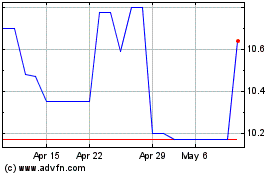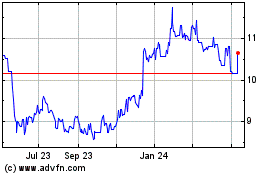New Taylor Swift Deal Shares Spotify Wealth -- WSJ
November 20 2018 - 3:02AM
Dow Jones News
By Anne Steele
This article is being republished as part of our daily
reproduction of WSJ.com articles that also appeared in the U.S.
print edition of The Wall Street Journal (November 20, 2018).
Taylor Swift, the biggest free agent in music, signed a
long-term deal with the world's biggest record company, Vivendi
SA's Universal Music Group, in the process using her clout to try
to score some points for other artists signed to the same
label.
Ms. Swift's new deal came with a stipulation: Proceeds from any
sale of Universal's stockholdings in Spotify Technology SA are to
be distributed to the label's artists at a better rate than paid
out previously by the other two majors.
Detailed terms weren't disclosed.
This is the first label change for the 28-year-old pop star, who
was signed when she was just 15 years old to Nashville-based Big
Machine Records, an independent label distributed by Universal that
released all six of her studio albums.
The Spotify agreement was a major sticking point for Ms. Swift,
who had been courted by major labels and other companies as her
deal with Big Machine expired earlier this month, according to a
person familiar with the matter. She also considered options such
as distributing her own music, this person added.
"I see this is a sign that we are headed toward positive change
for creators -- a goal I'm never going to stop trying to help
achieve, in whatever ways I can," Ms. Swift wrote in an Instagram
post Monday.
No. 2 label Sony Music Entertainment sold 50% of its Spotify
shares in May and No. 3 Warner Music Group sold its entire stake in
August. Universal hasn't indicated it is nearing any sale of its
Spotify shares and as recently as May Vivendi Chief Executive
Arnaud de Puyfontaine said the company had no immediate plans to do
so.
Universal's Republic Records, which had been distributing Ms.
Swift's music in the U.S. under her previous deal with Big Machine,
will continue to do so in the new contract.
Ms. Swift's older recordings remain under the control of Big
Machine, which will continue distributing them via Universal. Any
music she records during her new multi-year, multi-album contract
with Universal will remain her property, according to Ms. Swift.
That is a perk reserved for only the biggest superstars; typical
record contracts leave recordings, and the right to exploit them
commercially, in the hands of the label.
The deal is Ms. Swift's latest public use of her star power as
leverage to advocate for artists in an industry whose economics
have been upended by streaming. In 2015 she wrote an open letter to
Apple Inc., explaining she would hold back her album "1989" from
its streaming service because the company wouldn't compensate
musicians and songwriters for the free three-month trial period
offered to Apple Music customers. Apple quickly reversed course
after Ms. Swift posted the letter online and said it would pay
artists after all.
Ms. Swift, a 10-time Grammy winner, is the youngest person in
history to win Album of the Year, and is the first female solo
artist to win it twice. She is the only artist to have four
consecutive albums sell more than one million copies in their first
week of release.
Separately, Universal is among those with bids for Big Machine,
which has been considering a sale for several years, according to a
person familiar with the matter. Bids have reached as much as $300
million, according to another person.
Write to Anne Steele at Anne.Steele@wsj.com
(END) Dow Jones Newswires
November 20, 2018 02:47 ET (07:47 GMT)
Copyright (c) 2018 Dow Jones & Company, Inc.
Vivendi (PK) (USOTC:VIVEF)
Historical Stock Chart
From Mar 2024 to Apr 2024

Vivendi (PK) (USOTC:VIVEF)
Historical Stock Chart
From Apr 2023 to Apr 2024
